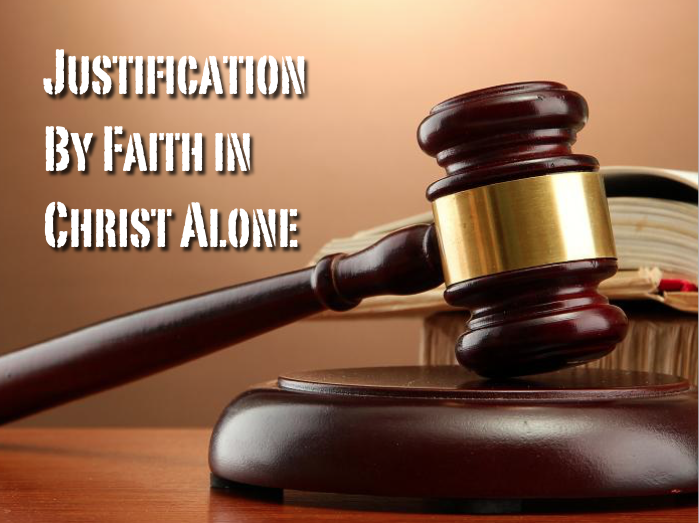Celebrating the 500 anniversary of the Reformation
The Reformation Recovered The Doctrine of Justification By Faith by Mike Gendron

When Martin Luther nailed his 95 Theses to the Castle Church door in Wittenburg 500 years ago this month, he ignited a theological firestorm that would burn throughout Europe. As a Roman Catholic monk, Luther's greatest desire was to become right with God, yet his religion offered no peace or assurance. This led him to begin a diligent study of God's Word and it was there that he discovered the only way a condemned sinner could be justified by a holy and righteous God. Luther's study of Scripture revealed the glorious doctrine of justification that had been concealed and corrupted by religious traditions for over 1000 years. The Bible declares the justification of sinners can only be accomplished by a divine exchange - the imputing of man's sins to Christ, and the imputing of Christ's righteousness to sinners (2 Cor. 5:21). The only way condemned sinners can be justified is through the sin-bearing, substitutionary death of Christ who satisfied divine justice.
The doctrine of Justification is said to be the hinge upon which the gates of heaven open and close. Those who get justification wrong also get the Gospel wrong, and those who die embracing a false gospel will pay for that mistake forever. The doctrine of Justification declares the inflexible righteousness of God as a Judge who must punish every sin, that has ever been committed, by everyone who has ever lived. It also declares His love, mercy, and grace in providing His only Son to be crucified as a substitute for sinners.
Many Christians are unaware of how the Catholic Church has twisted and distorted the biblical doctrine of Justification and condemned those who believe it. Yes, they have pronounced 33 anathemas from the Council of Trent on anyone who believes that they are justified by grace alone, through faith alone, in Christ alone. Since this has eternal consequences, we have provided 10 contrasts between the biblical Doctrine of Justification and the corrupted doctrine that continues to be taught by Rome. To print a copy of these 10 contrasts click here. The numbers in parenthesis are paragraph numbers from the Catechism of the Catholic Church.
1) Justification is by faith in what God accomplished in Christ (Rom. 5:1). Rome says initial justification is by water baptism (1992).
2) Justification changes one's legal status before God whereby a condemned sinner has been acquitted and declared righteous (Rom. 5:12-21). Rome says justification changes the inner man, not his legal status (2019).
3) Justification is an instantaneous act of God which immediately declares a sinner righteous (Rom. 4:3). Rome says justification is an ongoing process, the ongoing renewal of interior man (2019).
4) Justification is permanent and is never lost by sin. The legal status of a justified man is as unchangeable as the righteousness of Christ (Heb. 10:14). Rome says justification is temporal. It is lost by sin and regained through the sacrament of penance and good works (1446, 1861).
5) Justification is by grace apart from works (Titus 3:7; Rom. 11:6). God justifies those who do not work (Rom. 4:5; Gal. 2:16). Those justified receive the gracious gift of Christ's righteousness (Rom. 5:17). Rome says justification must include good works (2010). "If anyone says that the sinner is justified by faith alone, let him be anathema" (Trent, Canon 9). Rome says re-justification must be merited by making satisfaction for sins through works of mercy, prayer, service to neighbors, etc. (1459, 1460, 2027).
6) Justification is by imputation or crediting of Christ's completed righteousness to the one justified (2 Cor. 5:21; Rom. 4:5). Rome says justification is by infusion of God's righteousness which renews the interior man (1989).
7) God justifies the ungodly (Rom. 4:5). Rome teaches final justification is only for those who have become righteousness(2016, 2020).
8) After justification all sins are no longer taken into account or punished (Rom. 4:5; 2 Cor. 5:19-21). Rome says that sins committed after justification will be punished either in purgatory or in hell (1030, 1861).
9) God promises to glorify everyone He justifies because those justified can never be condemned (Rom. 8:1, 8:30). Rome says that God will condemn to hell anyone who was justified (by water baptism) but who dies in mortal sin (1861).
10) Justification precedes sanctification (Rom. 6-8). Rome says justification is an integral part of sanctification (1995).
The righteousness that justifies the ungodly sinner is an alien righteousness that was accomplished outside of and apart from man. It is the completed righteousness of Jesus Christ and is given as a gift from God apart from any merit or work of man. His perfect righteousness is imputed at the moment the redeemed is united with Christ by faith. The righteousness of Christ is our passport into heaven! No one will enter into glory without it (2 Peter 3:13).
|
Letters from Around the World

Mike, I was so glad to see that you took a stand about Johnnie Moore's pandering to Pope Francis, and his complete ignorance of Catholic doctrine. What a sad commentary about those who are in leadership within the so-called 'Christian' church of today. As a writer for GotQuestions.org, I get quite a few questions about Catholicism, and like you, I try to explain the sheer apostasy of that massive religious system, with the hope of shining the light of truth into people's hearts. It's sad that more believers won't take a public stand against sin and apostasy. I believe that God says we are to 'expose' those who are spewing falsehood, or apostate teaching, charged in Ephesians 5:11-13. I've dealt with Dr. Russell Moore and the leaders of the SBC due to their support of a lawsuit to help Muslims build a mosque in New Jersey. Even though it's a sign of the times in which we live, we have to keep fighting the good fight until He comes. Keep speaking out, and keep doing what you're doing. Come Lord Jesus, S. P., Mt Juliet, TN
Hello Mike, I need some advice. I was called out of the Catholic Church back in 2002. Now I am an Elder at a reformed church that unashamedly defends God's word. However, much to my surprise, I found out that my church is amillennial. This greatly troubles me. I do not understand how they can take such a strong stance on God's word but totally spiritualize and allegorize the second coming of Christ. My church is part of the I'll Be Honest group of churches. When you spiritualize so much of the Bible it is a serious issue. God's plan to redeem His creation through Jesus Christ and how he is going to fulfill all of His covenants, including His covenants with Israel, is playing out before our very eyes. I feel sure I need to step down as an Elder and find another church. J. K., Hastings, MN
Hi J.K., Unfortunately, there are many in reformed churches who embrace the amillennial position of the Reformers. As you may know, the Reformers never developed a biblical view of eschatology. Instead, they held the same amillennial position of the Roman Catholic Church. Today, there are many Reformed leaders who choose to follow the Reformers instead of the Apostles. They allegorize literal prophecies concerning the 2nd Coming of Christ. Such a position leaves all prophetic Scriptures open to misinterpretation. Also, an inconsistent hermeneutic will lead to faulty interpretations in other areas of theology. We need to encourage everyone to build their eschatology on Christ and the apostles rather than the Reformers. It would be my privilege to counsel with you on the phone and offer biblical advice for you to consider.
By Mike Gendron
|

Comments
Post a Comment